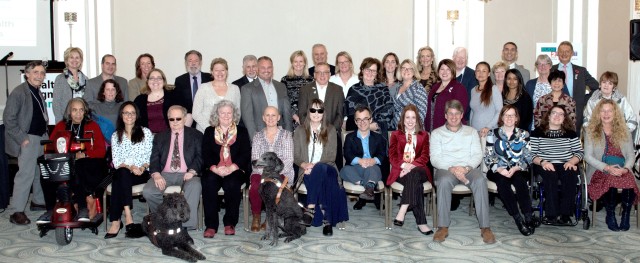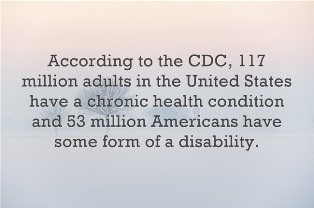Rude2Respect: A Summit on Facing – and Challenging – Health Stigma
Posted on January 09, 2018 |

This post was written by Jane Martin, BA, LRT, CRT, Assistant Director of Education at the COPD Foundation.
I had the honor of attending the first Rude2Respect Summit in Evanston, Illinois. The summit was a gathering of individuals representing more than 40 chronic health conditions or disabilities – disorders often confronted with the burden of health-related stigma.
We began the day by looking at the term “stigma.” One common definition is “a judgment of lower status,” more specifically as “the belief that one possesses some attribute or characteristic that conveys a social identity that is devalued in a particular social context.” That word “devalued” put me on notice that this summit was going to not only inform me, but enlighten me.
Over the course of the day, being surrounded by individuals representing, and living everyday with, those over 40 health conditions, I was surprised to learn how large the community of individuals with chronic diseases actually is. As individuals with COPD or health care professionals who care for, educate and support those with COPD, we are actually part of a greater community, one that’s much bigger even than the estimated 30 million people with COPD. Although an individual confronted by health stigma may be one in an army of many millions, he or she may be facing their struggle all alone.

In addition to presentations by internationally known experts on topics including continence difficulties, hearing and vision loss and facial disfigurement, a panel of 10 participants, each with a different stigmatized health challenge, shared their stories of heartbreak and triumph. In this session I learned that stigma is communicated in many ways: an intrusive stare, an obviously avoided encounter or a thoughtless comment. Conscious or unconscious, these actions express attitudes that erode an individual’s self-worth. Stigma focuses on the negative, even ugly, aspects of a condition while failing to see the worth of the person with that condition. As I listened to these powerful stories from individuals who often encounter stigma-related incidents, I reflected on my own behavior. Did I ever behave that way towards someone whose differentness I did not understand? I answered myself that, sadly, I probably had.
COPD often carries with it a stigma that people with this disease “brought it on themselves” by smoking cigarettes and, therefore, “had it coming.” Hmmmm…. Let’s take a closer look at this. For one thing, cigarette smoking is not the only cause of COPD. In fact, some studies have found that as many as 25% of people with COPD have never smoked a cigarette in their life. And, smoking as few as 100 cigarettes over the course of a lifetime can lead to COPD.
Furthermore, not all smokers get COPD. “Susceptible smokers” have many of the same behaviors as others – but, simply, they tend to be the ones who get COPD. With that in mind, who among us has never made a choice that was less-than-healthy? We may have consumed unhealthy foods or drinks or taken part in unhealthy behaviors – over years, or even decades – and were lucky enough to dodge the bullet.
There are many additional causes of COPD that have nothing to do with smoking, including airborne hazards (fumes, dust, or chemicals) at home or at work, early childhood diseases or genetic factors such as Alpha-1 Antitrypsin Deficiency, an inherited condition in which the individual lacks a specific protein in the blood.
No matter the cause of COPD, it is what it is, and it’s not always so clear cut. Overall, we should strive to proceed with compassion and kindness.
Living with COPD and similar chronic diseases often bring about an array of issues that may lead to health stigma including feelings of anxiety and depression. A participant on our COPD360 social community forum once stated, “Some days I don’t have a problem being on or coping with COPD. Then there are the days that I am so depressed about it that I don’t even want to talk to anyone about it, or for that matter, anything. I just hide and keep to myself.”
It is incumbent on all of us – patients, caregivers and healthcare providers – to strive to do what we can to eliminate stigma related to COPD and provide patients with the support and care they need to manage their chronic conditions. All people with COPD deserve to be treated with dignity and respect.
Through my participation in the Rude2Respect Summit I was introduced to a platform that will raise the national consciousness of health-related stigma. On a more personal note, however, I was blessed with getting to know some courageous, inspiring people of great strength and beauty. I’m so glad I went.
Visit the Rude2Respect website, especially the Challenge Wall, at www.rude2respect.org.
Thank you to Bret Denning, Care Delivery and Communications Program Specialist, for his contributions to this post.
This page was reviewed on March 3, 2020 by the COPD Foundation Content Review and Evaluation Committee